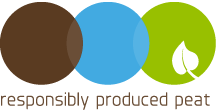The RPP certification scheme:
5 chapters on production and
1 on the Chain of Custody.
1. Legality
Peat producing companies have to comply with all applicable laws and regulations of the country and relevant international laws and agreements.
- Prove of licenses, permits and other legal requirements for producing peat at all their production sites.
- Prove of awareness of legal obligations.
- Other involved companies (in case of joint ventures or sourcing from other companies) should produce legally.
2. Good governance
Peat producing companies are transparent about their operations and organize stakeholder dialogue and participation.
3. Site selection
Selection of extraction sites is in compliance with all relevant EU directives, government legislations and regulations.
- Local and regional stakeholders will have to be consulted
- Peatland with high conservation value (HCV) will not be selected
- Drained and degraded peatlands shall be prioritized for extraction
4. Site preparation and peat extraction
An EIA (Environmental Impact Assessment) of all potential on and off site impacts will be conducted.
Based on the EIA, a mitigation and monitoring plan shall be presented. The plan includes responsible site management and will be taking account of requirements for proper after-use.
5. After-use / Rehabilitation
A clear after-use plan will be available and secured at all times. The after-use plan is developed in consultation with:
- Relevant public authorities
- Relevant stakeholders, including local communities and NGO’s
The destination shall be the best possible option, with maximum environmental benefits including climate mitigation.
Preference is rehabilitation to original natural conditions, as close as possible and practically feasible.
6. Chain of Custody and RPP-labelling
The Chain of Custody provides certainty that the peat in the product, is coming from RPP-certified locations.
The methodology is based on a system of Mass Balance which means that RPP certified and non-certified peat can be mixed.
The administrative system of the company shall ensure that volumes of RPP-certified peat can be proven at all times.
All companies within the RPP Chain of Custody have to be RPP registered (click here for more information on registration). Suppliers of the non-certified peat either register or sign the due diligence agreement. See also under "Get involved" in the menu and scroll down to the second block.
Which locations are eligible?
Check the minimum requirements:
No conservation area
Peat extraction cannot take place in an area with High Conservation Values (HCV), nor affect peatlands with HCVs nearby.
An Environmental Impact Assessment (EIA) has to be performed to evaluate the area.
Legislation and licenses
Site selection must be in compliance with government legislation and regulations on all levels. This includes all relevant EU directives.
You have valid licenses for extraction and land rental or ownership. Local and regional stakeholders have to be consulted before site selection.
Degraded peatland
Drained and degraded peatland are prioritized so that ecosystem services will be given the opportunity to improve after the extraction of peat.
The advantages of RPP certification
Contribution to availability of peat
Peat is still the most valuable and reliable component in many substrates for horticulture. RPP certification shows that your peat is produced with respect for the environment. This is essential to achieve public and political acceptance for peat production in the future.
Tool for communication
RPP certification proves your product is coming from responsible sources. It can help you towards sustainable management which enhances your business reputation. This could create new marketing opportunities. Since National legislation and environmental policy guidelines differ between countries in Europe, RPP offers a recognizable and credible communication tool.
In 'Good Reasons for RPP-Certification' you will find more arguments why you should start certification now.
A better future for all
Responsibly Produced Peat prohibits peat extraction on valuable natural peatlands. By becoming certified you help protecting these peatlands. Equally important is that you help raising opportunities for degraded peatlands to recover in the longer term. You increase your share in protecting ecosystems and reducing impacts on climate change for a better future for all.
Documents to start RPP-certification:

Procedure RPP certification
For Peat producing companies

Application form
RPP certification
For Peat producing companies

RPP Registration agreement
For companies entering the Chain of Custody or other organisations and persons
-(1)-116-116.png)
RPP Certification fees
For Peat producing companies and the Chain of Custody
The RPP TOOLBOX
Responsibly Produced Peat has developed a toolbox which contains guidelines that can provide help during your certification process. Currently the toolbox contains 5 guidlines:
- Mitigation measures to minimize impacts of operations on adjacent areas with High Conservation Values (areas that need to be preserved)
- Methodology for hydrological monitoring
- Methodology for estimation of GreenHouse Gas emissions (CO2 emissions).
Background information on the methodology for GHG-emissions - Decision tree to find out if undeveloped peat fields, adjacent to existing peat extraction areas, are mires with High Conservation Values.
- 2025 Required information on After-Use plans_3 Levels. These guidelines show what needs to be addressed for the assessment of After-Use plans.
- 2025 Checklist necessary field conditions for After-use implementation. When completed, this checklist outlines the necessary conditions for the successful implementation of the selected after-use destination.
- Overview results for Benchmarking 2019-2020 (Exceldocument)
Overview results for Benchmarking 2019-2020 (Pdf Document)

.JPG)